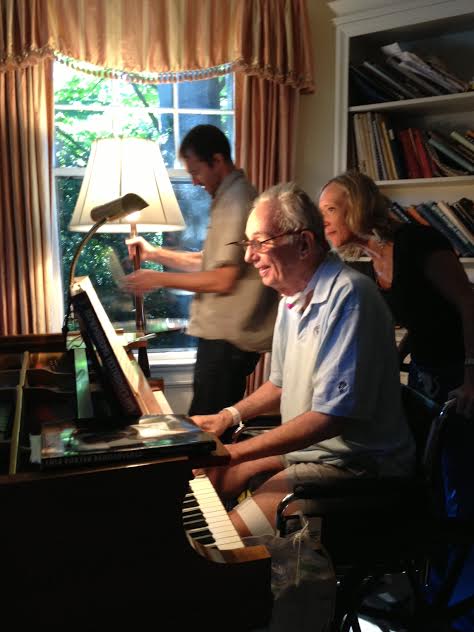Advertisement
West Nile Story: 400 Days In Hospital, A New View Of Health Care (And Life)
Guest contributor
In August of 2012, Charlie Atkinson was bitten by a mosquito in the garden outside his home in Cambridge, Mass.

From that bite, against the odds, he contracted West Nile Virus. It nearly killed him.
Charlie was in a coma for more than a week, paralyzed in his left arm and right leg. He spent more than 400 days total in two hospitals. He is still recovering.
Before the fateful insect bite, Charlie, married, with four children and nine grandchildren, was incredibly active. He was an avid tennis player, a self-taught pianist, an educator and entrepreneur who started numerous companies. West Nile Virus changed that life.
I met Charlie, now 78, on a snowy December day at his home, now retrofitted with a wheelchair ramp and a stair lift. We spoke in the sunny dining room, which has been transformed into a bedroom, complete with a hospital bed and Charlie’s ventilator equipment (he has a tracheostomy and is on the ventilator at night). Charlie lay propped up on his pillows as we spoke, and his warm handshake and bright eyes made me feel right at home.
A self-described “Just Do It” guy, Charlie fought his way back from near death with amazing determination. He surpassed the predictions of the medical community and has continued to make progress: he can now get around with a roller walker and even take steps on his own with a cane.
But beyond his physical comeback, Charlie's story is also about learning to be a smarter patient; questioning the conventional medical wisdom and seeking out health care providers who are truly compassionate.
Listen to Charlie here:
West Nile Virus is an arthropod-borne virus (an arbovirus), most often spread by mosquitoes between the months of June and September. It has been found in 48 states (all but Hawaii and Alaska) and in the District of Columbia. It was first detected in North America in 1999 and has continued to spread since that time. In 2013, the CDC reported 2,374 cases and 114 deaths.
With an incubation period of 2-14 days, only one in five people infected will develop symptoms, most commonly fever, body aches, joint aches and other relatively minor ailments. Less that 1 percent of infected individuals develop serious and at times fatal neurologic illness, including encephalitis and poliomyelitis, like Charlie. While the odds of serious illness are low, the consequences can be devastating. Without any viable treatment options or a vaccine, prevention is essential.
West Nile isn't something we typically worry about, but after hearing Charlie’s saga, I know I will be more conscientious about covering up, applying mosquito repellent and staying indoors during peak mosquito hours during the summer months.
More importantly, Charlie’s story has taught me a lot about the power of a positive attitude in healing. In coming to terms with his lasting physical deficits, he also acknowledges that there are some things he now does better than he did before his illness. For instance, in learning to use his hands again, he feels his piano playing has improved. In his words, “I now hit the notes more accurately than before I got sick.”
Charlie would like to express his tremendous gratitude to the medical institutions where he received his care, Massachusetts General Hospital and Spaulding Hospital for Continuing Medical Care in Cambridge. In his words, “They saved my life and made it worth living.”
Dr. Annie Brewster, author and audio producer, is a Boston internist and founder of Health Story Collaborative, a non-profit organization dedicated to harnessing the healing power of stories. You can hear and read more of her stories here, here and here, as part of our Listening To Patients series.